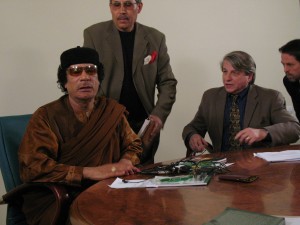 It’s strange when someone you’ve seen up close, even for just a few hours, gets killed. Even when they were terrible and had it coming. You see that grey-skinned person bleeding, sagging, disoriented, afraid in the mob, and later you see him dead and stripped.
It’s strange when someone you’ve seen up close, even for just a few hours, gets killed. Even when they were terrible and had it coming. You see that grey-skinned person bleeding, sagging, disoriented, afraid in the mob, and later you see him dead and stripped.
It’s strange.
In February 2007, I was part of a small group of journalists invited to travel to Libya to witness an exclusive debate, a conversation really, between Muammar Gaddafi and the prominent social scientists Benjamin Barber and Anthony Giddens. Broadcaster David Frost (Sir David Frost) would be the moderator.
The Brother Leader and his interlocutors would be meeting at a conference hall in the town of Sebha on the edge of the Sahara to talk about democracy and representative government. The journalists – myself, Ian Black from the London Guardian, Michael Slackman of the New York Times, and a crew from the BBC – were to watch the exchange without actually interacting with the eminent personalities.
The event, organized by a Boston consultancy, The Monitor Group, appeared to have two goals. One was to demonstrate that Libya, a state that epitomized brutal one-man rule, was opening up. This would be accomplished by showing that same one man discussing the possibility of opening up. The second, and probably more important, goal appeared to be to use the event itself as a prod that would move Gaddafi toward the very reform they contended was already taking place.
Since the Libyan revolt erupted — four years after that strange sit-down with the Leader — the Monitor Group, Barber, Giddens, and the London School of Economics have been condemned for their allegedly too-cordial relations with that awful regime. Maybe some of the flak is warranted. In 2007, however, when only one Arab tyrant had fallen, and that due to an American invasion, it looked like a second generation of Gaddafi rule in Libya was sure thing. Seif al Islam, the bright son, an LSE graduate and pupil of Giddens, said he wanted to take the country in a kinder and more productive direction. There were less-bright sons, crueler ones. Seif seemed the way to go.
Bunco as the reform plans sounded (in-house Libyan reformers talked about turning the country into the “Scandinavia of the Middle East”), I don’t recall anyone then with a more plausible positive vision for the future.
Whether they’re running a company, a city, a religious cult, or a country, there’s an emperor-has-no-clothes aspect to every big leader and the way they interact with their courtiers and factotums.
This fantasy quality was pronounced during Gaddafi’s conversation with Barber, Giddens, and Frost, and in his relations with his staff. The Leader insisted that representative democracy was slavery, and all but swore that angels, unicorns, and Nobel prize-winners were queuing up for visas to live in his Libyan utopia. No one walked out on this nonsense. After all, he was very rich.
In contrast with the terror shown by most Libyans when I asked what they thought of Gaddafi, the Leader’s aides seemed to enjoy a genuinely warm rapport with him. They doted on and cared for the boss. I imagined they loved him.
At the end of the democracy dog-and-pony show, the organizers asked if any of the visiting journalists had a question. Not wanting to risk my visa, which allowed me to travel in Libya without an official minder, I held my tongue. Michael Slackman of the Tiems took the bait and politely asked Gaddafi – I can’t recall his exact words – how he could talk about democracy when his people so obviously lived in fear.
There was a flurry distress around the Leader. His aides refused to translate the question. According to two people who worked closely with him, Gaddafi did in fact speak English, but he chose not to with most foreign visitors. In this case, it appeared he genuinely didn’t catch Slackman’s question. He looked from one aide to the other, confused, as the mood in the studio soured and we were moved into another room.
The reporters on deadline started working at their laptops and a while later Gaddafi came out to shake hands with us, a sort of peace offering. I had my chance, and kept back. Later we were flown to Tripoli on a musty private 737 with tarnished gold bathroom fittings.
Many thousands died in fear – fear for themselves, fear for their families – because of him. Millions more lived that way. That he went in the same fashion may be fitting. But like any violent death, Gaddafi’s execution betrayed a flaw in the human fabric. A person was there, and now they are gone.
Dan Morrison is author of The Black Nile.
(This piece first appeared at NationalGeographic.com)
